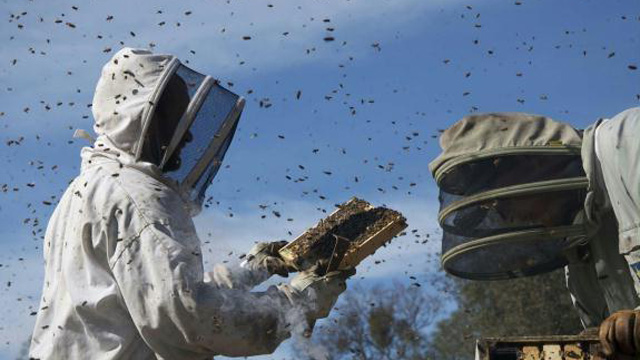I went to speak to the beekeeper, Robert MacKimmie. In a beret, farmer's market t-shirt, and goatee, he resembled a Californian Steve van Zandt, and he was crowded by mostly female honey-appreciators.
"That's extraordinary. That's really extraordinary," one man in a Giants cap said after a sample.
"Do you ever need people helping you?" asked a blonde woman in a leather jacket.
"Always," replied MacKimmie. When asked about dealing with bees, he replied, "I'm just pretty chill about it. I don't even wear a veil anymore. They don't sense me as being hostile." The woman offered her hand to shake and he gestured that his hand was too sticky, so they bumped arms.
San Francisco is the greatest honey city in the world, MacKimmie told me, because of "the hills, the fog, and all the crazy weather." As a result, he says, honey made in one neighborhood will taste completely different from another.
People got up and started to head downstairs for the movie, and a woman told me my mustard-yellow pants were "just perfect for bees."
Before the film, a short played in which a woman enthusiastically discussed the joys of composting while trip-hop played in the background. The director of the short, a handsome man in a trenchcoat and white tee, went up, smiled bashfully, and thanked More Than Honey because "otherwise no one--" he caught himself-- "not this many people would have seen it."
More Than Honey is excellent. It presents amazing, extremely close-up footage of bees and juxtaposes it with interviews with people in the bee industry, all of whom are fascinating characters. The main human focus is on an eccentric old-school bee farmer in Switzerland and an exuberant American capitalist beekeeper, both of whom are portrayed as endearing despite that their approaches to beekeeping exemplify different likely reasons for the bee's decline. The Swiss beekeeper has an all-natural approach to beekeeping, but his obsession with keeping the bees "racially pure" means his bees are increasingly products of incest and therefore unhealthy. The capitalist is funny, and kind of a poet: "I'm getting real comfortable with death on an epic scale," he says at one point, but his desire to keep his company growing causes him to use pesticides, which we see kill the bees in close-up and slow motion. In a Q&A afterwards, director Markus Imhoof explained that the bee footage was shot at 70 frames per second in order to make the bees appear to move more like humans. For these reasons, I felt a sympathy for both the humans in the film, whose livelihoods were in decline because of their own fallibility, and for the beautiful bees they had enslaved and doomed.
"Beekeeping is the mirror of agriculture in a county, and agriculture is the mirror of the consumer," Imhoof said. "I want to contaminate you with swarm intelligence," he said, imploring the audience to go out and take action.
Imhoof was presented with an award for "Best Feature" that night. The award was 3D printed with corn starch, and it is biodegradable.

He asked the audience if they would rather have the non-English dialogue dubbed than in subtitles. "Most Americans don't read." said one audience member, and several others echoed the sentiment. "We're a special group," another added. "You go to New York and people will want something different." It was clear in that moment that humans are at least capable of one kind of hive mind, although I'm not sure it's a very healthy one.
That aside, I can't speak highly enough of More Than Honey. Hearing Imhoof speak so passionately about the bees after a movie that felt emotionally balanced if not politically so, gave me renewed hope in the idea of the artist as activist.
The crowd was smaller Wednesday night. Andrew Garrison, director of Trash Dance, introduced his film by saying, "You're allowed to enjoy it. If not, we're gonna burn out. Movies should not just be medicine." After a funny and well-acted short about a couple struggling to be intimate in a time of extreme global warming, Trash Dance began. The film centers around Allison Orr and her attempts to create a dance show with trash collectors. It also touches on the trash collectors' lives, their children and second jobs. Orr faces some uncertainty, including skepticism from the trash collectors and a flash flood, but ultimately I had total faith in her throughout-- like a real-life episode of Parks and Recreation, there was very little actual conflict or suspense, but I wanted to keep watching because everyone in it was so funny and charming. It's also legitimately touching to see garbage-collecting equipment used balletically. The film is less about the environment than it is about work, poverty, community, and the class-based preconceptions we have of each other, and of art.




